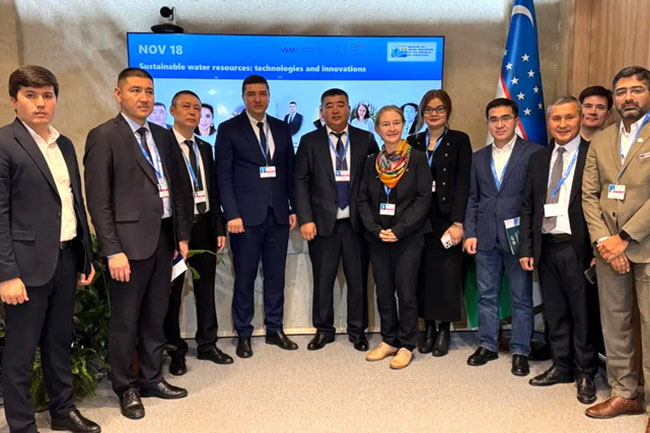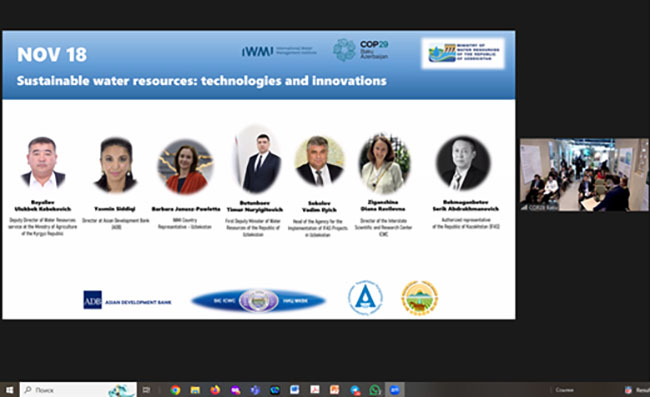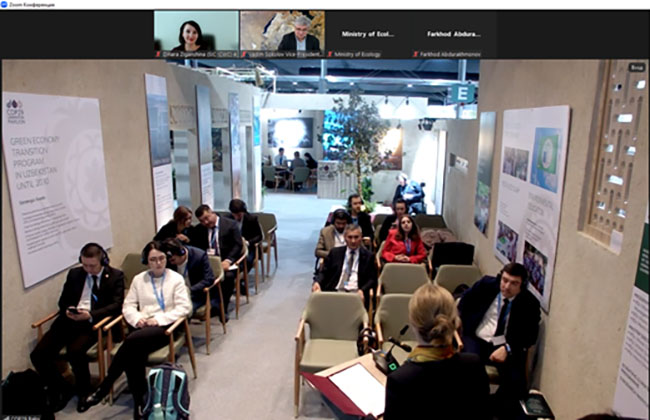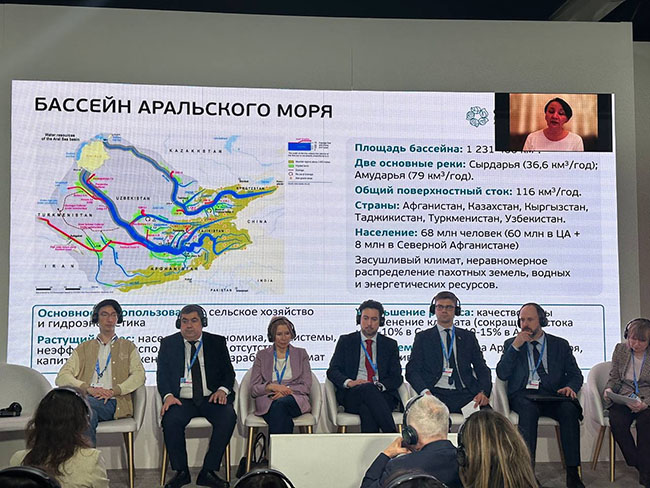No. 68 (513) November 2024
SIC ICWC AT COP-29 IN BAKU
As part of COP-29, a session titled "Sustainable water resources: technologies and innovations" was organized by the Ministry of Water Management of Uzbekistan on November 18.
Regional Director of the International Water Management Institute Barbara Janusz-Pavletta, Deputy Chairman of the IFAS Executive Committee Serik Bekmaganbetov, SIC ICWC Director Dinara Ziganshina, Head of the IFAS Agency in Uzbekistan Vadim Sokolov, Deputy Director of the Water Resources Service of the Kyrgyz Republic Ulukbek Bayaliev and others took part in the event.

First Deputy Minister of Water Management, Mr. Butunbayev, highlighted the water sector reforms initiated by Uzbek President Shavkat Mirziyoyev. He emphasized the enhanced efficiency of transboundary water use through cooperation with neighboring republics. Additionally, Mr. Butunbayev presented the nation's efforts in canal concreting, water-saving technologies, and digitalization of the water sector.

Dr. Ziganshina shared insights into the ongoing research at SIC ICWC, focusing on climate change impacts and adaptation strategies. She discussed the IKI project, the strengthening of partnerships through the Expert Platform on Water Security, and capacity-building initiatives for regional water management organizations. Furthermore, she presented the activities carried out under the UNECE Water Convention's adaptation program.

A panel session titled "One World – One Climate: Uniting Efforts on Transboundary Adaptation" was held on November 21, organized by the Strategic Initiative Agency of the Russian Federation..
The session focused on discussing strategies for transboundary adaptation, addressing issues such as water and energy security, agriculture, ecosystems, climate migration, and the prospects for collaborative projects.
In his introductory report, Alexei Kokorin (IPCC, Nature and People Foundation) outlined the main agreements reached at COP-29, highlighting the importance of international coordination under climate agreements and the critical role of scientific evidence in shaping adaptation strategies.
The first part of the panel discussion featured examples of adaptation efforts and water cooperation across countries and basins. Svetlana Bacherikova (Rosvodresursy) presented cases of ongoing water collaboration between Russia and neighboring countries, emphasizing key tools for protecting and sustainably managing transboundary water bodies. Rafik Verdiyev (Ministry of Ecology and Natural Resources of Azerbaijan) shared insights into joint adaptation projects in the Caspian Sea region.
Dinara Ziganshina (SIC ICWC) presented on the challenges and achievements in climate change adaptation and transboundary cooperation in the Aral Sea basin. She emphasized the importance of joint regional programs, research initiatives, innovations, educational efforts, and financing mechanisms to address these issues effectively. Aidar Yesembayev (International Centre for Green Technology and Investment Projects, Kazakhstan) shared Kazakhstan's adaptation practices, highlighting the relaunch of the Green Bridge Initiative as a platform for exchanging experiences and fostering collaboration..

The environmental perspective was underscored by Alexey Spirin (En+ Group), who presented research on environmental risks in the Baikal and Selenga basins. His report included an assessment of climate impacts on water availability in the region and recommendations for minimizing ecosystem damage. Natalia Lukina (Centre for Forest Ecology and Productivity Problems, Russian Academy of Sciences) highlighted the significance of nature-based solutions for biodiversity protection, showcasing successful projects focused on forest ecosystems.
Other reports addressed key financial aspects of climate adaptation. Representatives from PJSC Sberbank discussed adaptation financing instruments, while JSC Capt outlined financing mechanisms for cross-border projects. The Association «National Network of the Global Compact» highlighted the role of business in climate change adaptation.
The session underscored the need for an integrated approach and robust interstate cooperation to tackle climate challenges. Proposals included the establishment of joint educational platforms, dedicated funding mechanisms, and technology transfer initiatives. These ideas lay the groundwork for new projects aimed at fostering sustainable development and enhancing climate resilience.